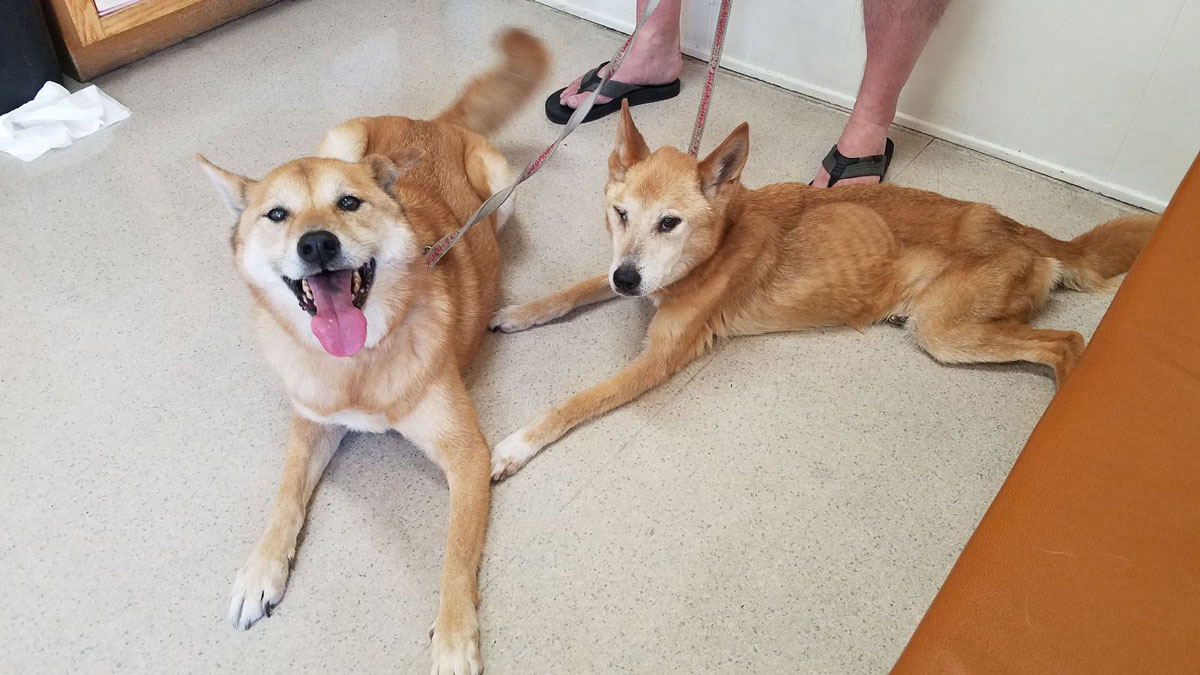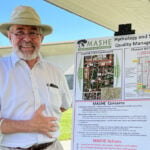OCEANSIDE — Despite being 16 years old, Maggie was a happy, healthy dog who seemed to have years of boundless energy remaining in her life.
The duck-tolling retriever loved to walk with her best friend and owner, Pete Gajria, along the peaceful, residential trail that winds through the Arrowood Village community in Oceanside.
The trail starts a few houses down from Maggie’s home at the corner of Bellingham Drive and Vista Pointe Boulevard and leads to the community’s park area.
In April 2021, just like many others, Gajria and Maggie walked to the park to play and explore the area. Maggie ventured over to a nearby tree, ate some grass and then when it was time for her to return to Gajria, she suddenly fell down and couldn’t get up, according to Gajria.
“I had to call my wife to come pick us up,” Gajria said.
Back at home, Maggie continued to walk unsteadily and fell down the steps, injuring her leg. Later in May, Maggie was once again walking the trail with her owner when she began to walk unsteadily and fell down again. She also experienced other symptoms, such as diarrhea and vomiting.
About two weeks later, Gajria took Maggie to her veterinarian where she has prescribed medication for her leg. But Maggie’s vomiting and diarrhea symptoms continued, and she had also lost significant muscle mass by that point as well.
Maggie also had blood in her stool. No toxicity check was done at the time, according to Gajria.
Maggie eventually had to be put down just days after Christmas last year. In the death report, the veterinarian noted that Maggie had suffered multiple seizures and internal bleeding and her hind legs had deteriorated.
Dommie
Just a few houses down from where Maggie and her family lived on Bellingham Drive in Arrowood Village, Joey and Sheana Trecartin went through a very similar situation with their dog, Dommie, a 12-year-old Korean Jindo.
Both Dommie and her brother, Rios, were born on Halloween 2008. The family moved to Arrowood the following year and have been there ever since, walking the same route along the residential trail, just like Maggie and Gajria.
Sometime in February last year, just months before Maggie started showing symptoms of her illness, Dommie fell ill with similar symptoms of vomiting and weight loss.
“She couldn’t keep any food down and there was blood in her stool,” said Joey Trecartin.
The family took Dommie to the vet where they did blood work. The results confirmed symptoms of rat poisoning.
“We don’t have any rat poisoning or anything like that in our home,” Joey said.

Dommie weighed roughly 35 pounds, but she was a mere 17 pounds when she was put down in June. Rios, her brother, never fell sick.
“We think she was affected and not her brother, Rios, due to the fact that she was always the cleaner of the two,” Joey said. “She would always lick her paws clean, his paws clean, and would clean herself and her brother like a cat would.”
Without any rat poisoning in or around the house, signs point to something outside of the home altogether.
Coincidence or disturbing trend?
Both pet owners soon realized they weren’t alone. After connecting with neighbors during a homeowners’ association meeting, they learned that since 2020, approximately 34 pets had fallen ill under similar circumstances throughout the Arrowood community. Eighteen of those animals later died, including Dommie, Maggie and two kittens.
Starting in 2020, Arrowood Master Homeowner’s Association hired BrightView Landscape Services as its new landscaping company. Many residents wondered if the company’s spraying of pesticides had poisoned the animals of Arrowood, particularly those walking along the trail.
In addition to pesticides, there are rodenticide tamper-resistant bait stations placed along the trail and throughout the community. The Arrowood HOA contracts Rodent Pest Technologies to administer those particular rodent traps.
According to a map provided to The Coast News, there are approximately 76 bait stations in the Arrowood Village neighborhood, but some residents have reported counting a higher number in the area.
Bait StationsBoth BrightView and Rodent Pest Technologies are licensed pest control businesses contracted as the only companies administering pesticides in Arrowood HOA.
In early June last year around the time Dommie was put down, Joey Trecartin called the HOA office requesting a list of pesticides used by the company. Melissa Brown, who manages Arrowood Master Homeowners Association on behalf of Avalon Management Group, sent the list to Trecartin and also mentioned the use of bait stations.
“In terms of rodent control, we do have bait stations in various areas throughout the community, however they are locked and are not accessible by animals,” Brown told Trecartin via email.
Brown did not respond to multiple requests seeking comment for this story.
The company’s list of pesticides includes Roundup QuikPRO, SureGuard, Speedzone Southern, Tandem, Meridian 0.33 and Despot, which could harm animals if applied incorrectly. Some of the pesticides, such as Roundup and Meridian, further require the applied areas to completely dry before it’s safe for human or animal contact.
Roundup QuikPRO uses a higher concentration of the herbicide glyphosate. Animals that eat grass with glyphosate on it can experience vomiting, diarrhea, appetite loss, and lethargy.
According to Taylor Grider, of the San Diego Humane Society, both Avalon and BrightView provided prior notice to residents about the spraying of pesticides, which is not required. Areas that are sprayed have also been sectioned off and entire streets are closed when spraying occurs.

As for rodent control, Brown explained in an email to Gajria that Ditrac, a rat and mouse bait, is placed in the tamper-proof stations usually at the tops of slopes or against walls, and they aren’t always visible depending on the landscape. RCO Omega, single-feed strychnine grain bait, is a pellet placed underground in gopher holes only when the rodent is detected.
Though the stations are supposedly tamper-free, Gajria and other residents wonder if the bait stations could be leaking somewhere. Some have observed animals like owls dropping dead suddenly, or mice stumbling around looking disoriented.
Gajria said his wife, Teri, once observed a mouse clumsily crawling around on the ground one day and they suggested that, at least in some cases, pets that eat contaminated rodents could fall ill from the poisons contained within them.
For months now, residents have been voicing their concerns at the HOA meetings, but many feel as though Arrowood isn’t doing enough to address the situation and withheld information about the use of rodenticide from residents.
According to Grider, Brightview was instructed to temporarily stop spraying pesticides between April and December 2021. Meanwhile, rodenticides continued to be used in the common areas throughout the neighborhood.
County finds ‘no correlation’ between dogs, pesticides
A complaint regarding pesticide misuse was made to the California Environmental Public Agency, which referred the case to San Diego County’s Land Use and Environment Group’s Department of Agricultural Weights and Measures which operates the county’s Pesticide Regulation Program (PRP).
“Evidence was collected through interviews, reviewing pest control business licensing, registration, permits, pesticide use records and reports, and conducting headquarters inspections,” said Donna Durckel, spokesperson for Land Use and Environment. “A PRP inspector visited the Arrowhead HOA on two occasions as part of the investigative process.”
The investigation was completed on April 22.
“We determined there was no correlation between the dogs’ illness symptoms and the pesticide activities at Arrowood homeowners association,” Durckel explained. “The investigation conclusions are based on statements by neighborhood residents, an HOA representative, Brightview Landscape Service and Rodent Pest Technologies, as well as a pesticide use record and a lack of veterinary medical reports.”

Dommie was the only dog found to have been poisoned by rodenticide.
“We also reviewed pesticide labeling and determined the legal and registered pesticides were applied in accordance with the pesticide labeling, pesticide laws and regulations,” Durckel added.
Gajria also reached out to the San Diego Humane Society for help, but the group’s investigation didn’t find any wrongdoing either.
Grider told residents that she interviewed Nancy Wickus, the senior inspector who was assigned to the case through the county.
“In her experience, the pesticide-related illnesses may have come from homeowners themselves due to improper handling/use: not reading pesticide labels or not using them for their intended use, unlicensed landscapers using pesticides that are unregulated and require licensing to use,” Grider wrote in an email to Arrowood residents. “Licensed professionals, such as the BrightView employees, are trained on what to use, when to use it, how to use it and use specific measurements.”
Grider also explained that she learned BrightView had been using synthetic herbicides “with very few chemicals with a very low toxicity level.” Now, BrightView is using organic acid solutions per the request of community residents, but Grider noted that these solutions are more toxic than synthetic ones.
Grider also noted that the gopher pellets used are placed deep underground in very low quantities and kill gophers almost immediately, meanwhile a dog would need to ingest a lot in a short amount of time to fall ill.
“Based on my investigation and the evidence collected, it does not suggest malicious and intentional poisoning of the dogs,” Grider told the affected residents.
Residents unconvinced
Gajria is not convinced and feels that Arrowood residents who have lost their dogs over the last two years have been treated callously.
“It is statistically impossible for all the dogs’ deaths to be caused by homeowners poisoning their own pets over a two-mile radius,” Gajria said. “Nancy’s suggestion implies that all homeowners are colluding and are working together to eliminate pets of various sizes and breeds.”
Without answers and accountability, affected residents remain frustrated and hurt by the loss of their beloved pets. Some also worry that whatever hurt their dogs could, later on, hurt young children and other residents in the area if left unchecked.
Though Maggie is gone, pictures and a painting of her adorn the walls in Gajria’s home. Her little bed sits next to his wife’s work computer, made complete with the Santa Claus dog toy she chose just days before she was put to rest.
“She was my buddy,” Gajria said.




1 comment
Time for a class action lawsuit! The blame shifting is appalling. So sorry to all the residents for your losses.
Comments are closed.